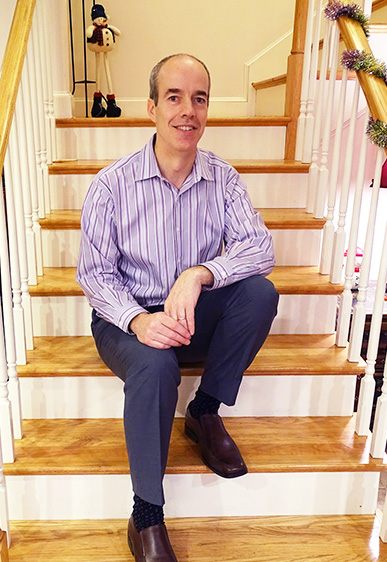Jonathan Dwyer’s forte at work and as a volunteer is making incremental improvements, and he hopes to apply the same skill set to the job of selectman if he is elected in March to replace outgoing Selectman Peter Braun.
Dwyer, 48, currently works for a large insurance company doing internal consulting to improve software speed and quality after doing something similar for Fidelity for many years. The Mahopac, N.Y. native moved to Lincoln with his wife, Lincoln native Carolyn Caswell Dwyer, around 1999. He started his Lincoln public service as chair of the Celebrations Committee, succeeding Nancy Pimental in heading up planning for the town’s Fourth of July events as well as other holiday commemorations. In 2010, he joined the Parks and Recreation Committee, which he now chairs.
“I feel strongly that you give back,” Dwyer said. “Being engaged in the town’s civil and government life opens up a whole bunch of relationships with people who work for the town and the citizens, people who are enthusiastic about making a difference in other people’s lives. Understanding how the town works and being a part of that is personally satisfying to me.”
Dwyer already has a busy life as the father of three girls, the youngest of whom attends the Lincoln School. He knows that if he becomes a selectman, he’ll have to step back from some of his outside activities, including one that has taken much of his time for the past several years: being moderator of the First Baptist Church in Newton.
As Dwyer described it, a church moderator is sort of a president or CEO—”a person who organizes its governance, makes sure the minister has what e or she needs to be effective, making sure the budget is being actively managed so the church is financially sound and the congregation is engaged.” His contributions have included making the service more approachable for people who did not grow up in the Christian tradition and modernizing the church’s governance.
Modernizing things by degrees—whether with software, a church or town government— is Dwyer’s sweet spot. “A lot of these institutions were designed 150 yrs ago. There are ways of collaborating and relating to each other that are different from back then, and we have to keep on adjusting,” he said. For example, in many situations involving software development, “people have grown into silos of not working together over time. My job is to bring people together, make decisions earlier and turn out improvements more incrementally.”
Getting residents involved in big decisions
The town is at various stages of pursuing some major capital projects including a renovated or rebuilt Lincoln School, a community center, expanded recreational facilities and more affordable housing. Given the costs involved, “we’re going to be living with these decisions for a long time, and it would be good if more of the town was engaged. I’m not so sure our dialogue today includes everybody, and I’m wondering if can do better in getting folks to understand what decisions are coming up and why their opinion is important,” he said.
Asked about how he sees these projects falling into place, Dwyer said, “I’m coming in with an open mind. I’m in favor of all these building projects, but I don’t know about the priority yet. I hope we can do all of them, but I don’t know if we can. The town should have the opportunity to prioritize and decide.”
As part of that process, Dwyer (if he is elected) hopes to begin by making Town Meeting—the town’s primary decision-making apparatus—easier to follow and attend. Among his ideas, which he has shared with Town Moderator Sarah Cannon Holden, are making the informational slides shown in the auditorium larger and more legible, or perhaps videotaping presentations by town boards and committees and making them available online beforehand. Other possibilities: having a time limit and a timer that speakers and audience members could see to control the amount of time at the microphone, and allowing instant feedback or even voting via a smartphone app or another digital device.
Although streamlining processes and helping people work together more effectively is central for Dwyer, so is the independent and questioning spirit that is part of the “Lincoln way.” He was raised as a Catholic but later found a home at the First Baptist in Newton (which is American Baptist, a denomination from which Southern Baptists split off just before the Civil War). He liked the fact that congregants felt free to think about and interpret the Bible and sermons in their own way.
“I was looking for an open-minded place that didn’t tell you what to think,” Dwyer said.
